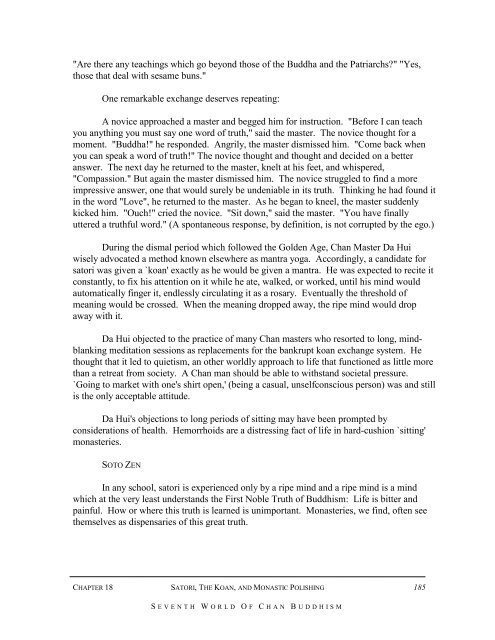seventh world of chan buddhism - Zen Buddhist Order of Hsu Yun
seventh world of chan buddhism - Zen Buddhist Order of Hsu Yun
seventh world of chan buddhism - Zen Buddhist Order of Hsu Yun
Create successful ePaper yourself
Turn your PDF publications into a flip-book with our unique Google optimized e-Paper software.
"Are there any teachings which go beyond those <strong>of</strong> the Buddha and the Patriarchs?" "Yes,<br />
those that deal with sesame buns."<br />
One remarkable ex<strong>chan</strong>ge deserves repeating:<br />
A novice approached a master and begged him for instruction. "Before I can teach<br />
you anything you must say one word <strong>of</strong> truth," said the master. The novice thought for a<br />
moment. "Buddha!" he responded. Angrily, the master dismissed him. "Come back when<br />
you can speak a word <strong>of</strong> truth!" The novice thought and thought and decided on a better<br />
answer. The next day he returned to the master, knelt at his feet, and whispered,<br />
"Compassion." But again the master dismissed him. The novice struggled to find a more<br />
impressive answer, one that would surely be undeniable in its truth. Thinking he had found it<br />
in the word "Love", he returned to the master. As he began to kneel, the master suddenly<br />
kicked him. "Ouch!" cried the novice. "Sit down," said the master. "You have finally<br />
uttered a truthful word." (A spontaneous response, by definition, is not corrupted by the ego.)<br />
During the dismal period which followed the Golden Age, Chan Master Da Hui<br />
wisely advocated a method known elsewhere as mantra yoga. Accordingly, a candidate for<br />
satori was given a `koan' exactly as he would be given a mantra. He was expected to recite it<br />
constantly, to fix his attention on it while he ate, walked, or worked, until his mind would<br />
automatically finger it, endlessly circulating it as a rosary. Eventually the threshold <strong>of</strong><br />
meaning would be crossed. When the meaning dropped away, the ripe mind would drop<br />
away with it.<br />
Da Hui objected to the practice <strong>of</strong> many Chan masters who resorted to long, mindblanking<br />
meditation sessions as replacements for the bankrupt koan ex<strong>chan</strong>ge system. He<br />
thought that it led to quietism, an other <strong>world</strong>ly approach to life that functioned as little more<br />
than a retreat from society. A Chan man should be able to withstand societal pressure.<br />
`Going to market with one's shirt open,' (being a casual, unselfconscious person) was and still<br />
is the only acceptable attitude.<br />
Da Hui's objections to long periods <strong>of</strong> sitting may have been prompted by<br />
considerations <strong>of</strong> health. Hemorrhoids are a distressing fact <strong>of</strong> life in hard-cushion `sitting'<br />
monasteries.<br />
SOTO ZEN<br />
In any school, satori is experienced only by a ripe mind and a ripe mind is a mind<br />
which at the very least understands the First Noble Truth <strong>of</strong> Buddhism: Life is bitter and<br />
painful. How or where this truth is learned is unimportant. Monasteries, we find, <strong>of</strong>ten see<br />
themselves as dispensaries <strong>of</strong> this great truth.<br />
CHAPTER 18 SATORI, THE KOAN, AND MONASTIC POLISHING<br />
S EVENTH W ORLD O F C HAN B UDDHISM<br />
185


